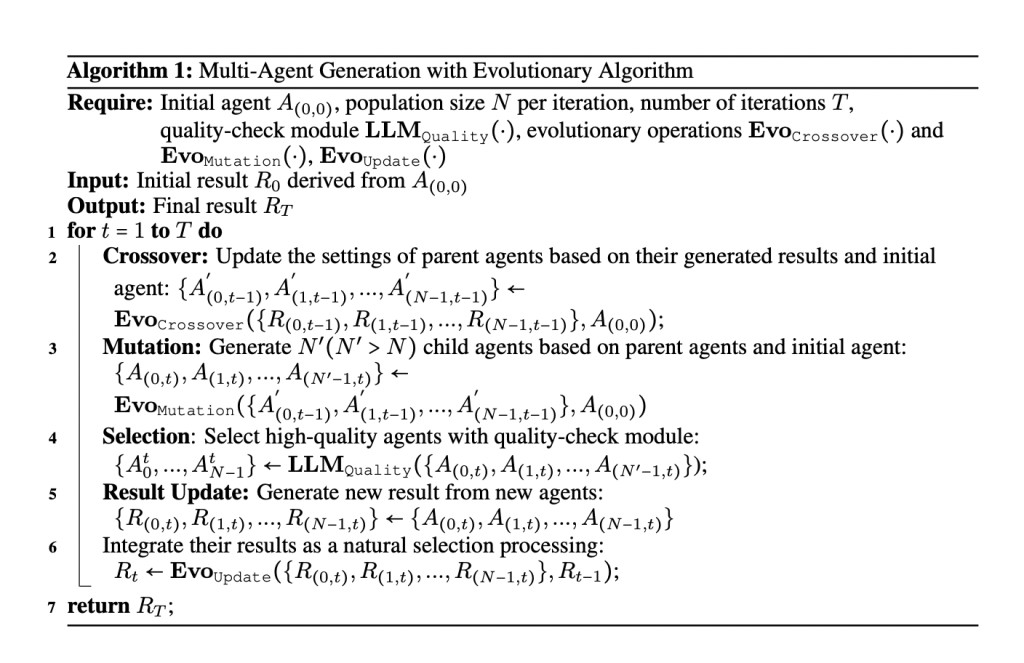Large language models (LLMs) have demonstrated remarkable capabilities in language understanding, reasoning, and generation tasks. Researchers are now focusing on developing LLM-based autonomous agents to tackle more diverse and complex real-world applications. However, many real-world scenarios present challenges that exceed the capabilities of a single agent. Inspired by human society, where individuals with unique characteristics collaborate to handle complicated missions, there is a growing trend to develop multi-agent collaboration frameworks. These frameworks aim to simulate human behaviors for solving complex tasks by utilizing the specialized expertise of multiple agents. Despite the potential of multi-agent systems, current designs heavily rely on handcrafted settings, limiting scalability due to expensive human labor. Consequently, creating a generic agent generation paradigm to automatically build multi-agent systems has emerged as a critical challenge in the field.
Existing attempts to solve multi-agent collaboration challenges have focused on developing autonomous agents with advanced LLM skills like personas, planning, tool usage, and memory. Some frameworks extend to multi-agent collaboration by designing specific roles, showing promising results for complex tasks. However, most rely heavily on handcrafted designs, limiting adaptability. Recent studies demonstrate the influence of personas on agent performance, but current methods involve manual assignment, hindering generalization. Frameworks like AgentVerse and AutoAgents aim to automatically generate agents for collaboration but still depend on human-designed interventions. These approaches limit scalability and functionality, constraining the task scope and highlighting the need for more flexible, automated methods.
Researchers from Fudan University and Microsoft Research Asia present EVOAGENT, a robust method for agent generation, formulates the process as evolutionary processing in human society. This approach simulates human behavior to automatically generate multiple agents based on pre-defined agents. Starting from a specialized initial agent, EVOAGENT evolves its settings through a series of operations like selection, crossover, and mutation. This one-shot agent generation method can create multiple evolutionary agents without additional human effort. EVOAGENT is not limited to specific agent frameworks, making it a generic multi-agent generation method applicable to various scenarios. Experiments conducted on multiple datasets, including knowledge-based question answering, multi-modal reasoning, interactive scientific solving, and real-world complex planning, demonstrate EVOAGENT’s ability to generate diverse agents with specialized skills, consistently improving model performance across different scenarios. The method also shows potential in generating multiple diverse agents for conversational scenarios like debates.
EVOAGENT operates through a four-stage pipeline that simulates evolutionary processing. The method starts with an initialization step, using a pre-defined agent framework as the initial (parent) agent. In the second stage, crossover and mutation operations are performed using LLMs to generate child agents with updated skills and diverse characteristics. The third stage involves a selection process, where a quality-check module ensures that generated agents maintain differences from parent agents while inheriting key characteristics. Finally, the results update stage integrates the outputs of child agents with previous results, improving task-solving capabilities. This process can be repeated to automatically generate more agents, effectively extending existing agent frameworks into multi-agent systems without additional human design. EVOAGENT’s evolutionary approach makes it applicable to any agent framework without prerequisites.
EVOAGENT demonstrates significant improvements across various tasks, including NLP, multi-modal reasoning, interactive scientific problem-solving, and real-world planning scenarios. In NLP and multi-modal tasks, EVOAGENT consistently outperforms existing methods like Chain-of-Thought prompting, Self-Refine, and Solo Performance Prompting across different language models. For instance, on the Logic Grid Puzzle task, EVOAGENT achieved 77% accuracy with GPT-4, compared to 65.5% for the next best method. In the interactive ScienceWorld environment, EVOAGENT improved GPT-4’s performance from 27.97 to 30.42 overall score. For real-world planning in TravelPlanner, EVOAGENT significantly enhanced performance across all metrics, particularly in meeting hard constraints and commonsense rules. These results demonstrate EVOAGENT’s versatility and effectiveness in generating specialized agents for diverse tasks, consistently improving upon existing methods and showcasing its potential for complex problem-solving and planning scenarios.
This research introduces EVOAGENT, an innovative automatic multi-agent generation system, that utilizes evolutionary algorithms to enhance existing agent frameworks. By employing mutation, crossover, and selection operations, it creates diverse and effective agents without additional human input. Experimental results across various tasks demonstrate EVOAGENT’s ability to significantly improve LLM-based agents’ performance in complex problem-solving scenarios, showcasing its potential to advance multi-agent systems in artificial intelligence.
Check out the Paper and Project. All credit for this research goes to the researchers of this project. Also, don’t forget to follow us on Twitter.Â
Join our Telegram Channel and LinkedIn Group.
If you like our work, you will love our newsletter..
Don’t Forget to join our 46k+ ML SubReddit
The post EvoAgent: A Generic Method to Automatically Extend Expert Agents to Multi-Agent Systems via the Evolutionary Algorithm appeared first on MarkTechPost.
Source: Read MoreÂ

